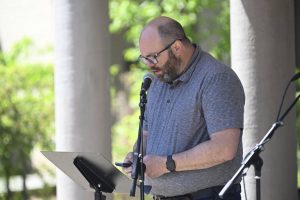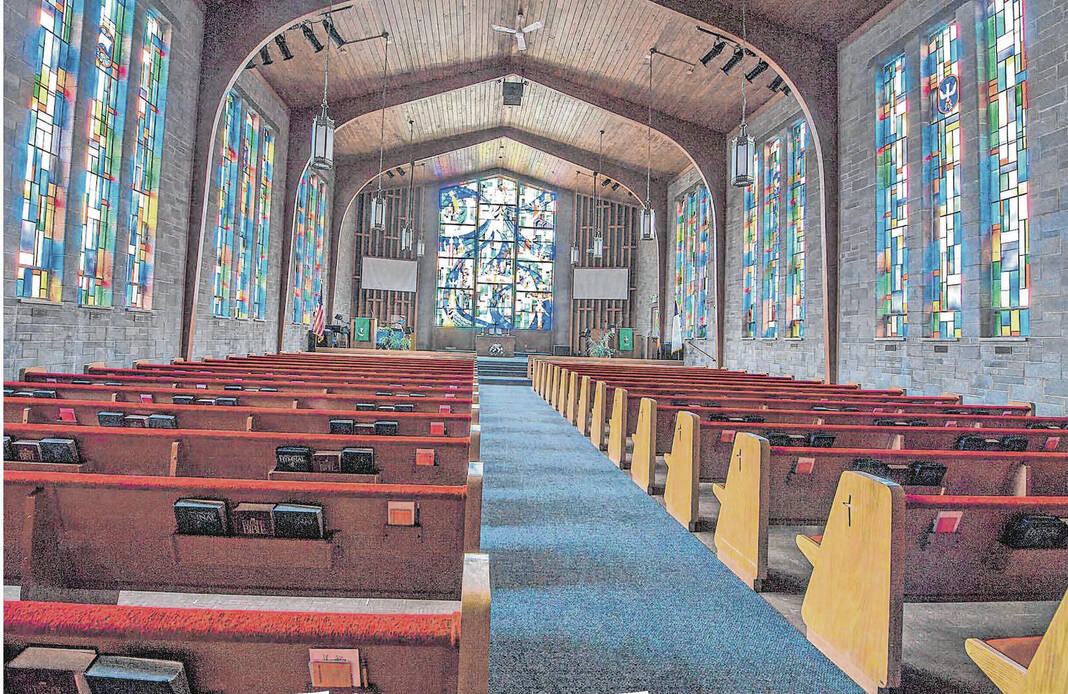GREENFIELD — Andy Flink thought his friend might be calling to talk about soccer.
But the friend was calling to ask Flink to consider becoming his pastor.
Fast-forward a few months, and Flink is senior pastor of Trinity Park Church. He preached his first sermon there as pastor on Sunday.
“It was a unanimous choice of the search committee,” said Jeanne Fletcher, chair of the church’s committee. “He was definitely the one that everyone thought … could help our church and be our next pastor.”

This is a new journey for both congregation and clergyman.
When the Rev. Larry Van Camp announced his retirement, the church — just a few months past its disaffiliation from The United Methodist Church — knew there was no new pastoral appointment coming from the denomination. The congregation had to find applicants on its own.
Meanwhile, Flink was associate pastor in the same non-denominational New Palestine church he’d attended as a child. He’d worked there since 2000 and hadn’t been looking for a new role.
“I was content to serve at Brookville Road (Community Church) until God called me home or until I retired,” he said. “I wasn’t looking to leave … (but) I just want to listen to whatever the Holy Spirit is saying to me.”
Through alumni sites for Christian colleges and seminaries, Fletcher said the committee “received over 30 quality applications.” None were submitted by Flink.
But Jared Manning, athletic director at Greenfield-Central High School, thought of a past assistant soccer coach in the girls soccer program: Flink. Manning had been to a funeral Flink officiated, saw how he interacted with people during some of the worst moments of their life, and heard the message he shared.
So Manning talked to friends at church, who found sermons online that Flink had preached at Brookville Road. As a courtesy, they talked to BRCC senior pastor Kris Sorensen, who was supportive.
‘START FROM SCRATCH’
George Morrell knows what that’s like, pulling up sermons online and trying to find a new pastor.
He attends what’s now known as Amity Community Church. Amity is one of several Hancock County congregations who, like Trinity Park, disaffiliated from The United Methodist Church.
More than 100 Indiana churches, and more in other states, have left amid disagreements such as proposed changes to the UMC book of discipline that states, “self-avowed practicing homosexuals are not to be certified as candidates, ordained as ministers, or appointed to serve in The United Methodist Church.” There has also been disagreement about the pastor appointment process and a “trust clause” about who owns local church buildings.
A global UMC conference was canceled in 2020 and eventually pushed to 2024. Without the closure some had hoped that meeting could bring, uncertainty has continued. Some say the debates are a distraction from the church’s overall mission. More Indiana churches’ disaffiliations will be on the agenda when the state UMC meets at its general conference in June at Ball State University.
Following disaffiliation, churches have to navigate tasks on their own, like hiring pastors or articulating what their newly independent church believes.
“All of a sudden you’ve got to start from scratch …,” Morrell said. “You’ve got to go out and make your own bylaws.”
It’s been work to figure these things out, but he said Amity’s new pastor, Randall “Randy” Worland, “has truly energized our church with his sermons and Bible studies.” Morrell hopes recent changes, including a Scout troop, will draw younger worshipers to join the congregation of about 40.
STATEMENT OF BELIEF
Ethan Maple has been through the start-from-scratch processes Morrell mentioned. Sunday, his congregation at Mt. Comfort Church elected a new slate of leaders in the first of what’s meant to be annual membership meetings.
“The decision to disaffiliate is easier than the work you have after that,” said Maple, who fields calls from churches about the process. “There is an extraordinarly large amount of work.”
Besides procedural matters, there are of course theological ones. People sometimes form their sense of what a local church believes based on its denominational ties. What about a newly “un-denominationed” church?
Maple ran across “The Faith Once Delivered: A Wesleyan Witness.” It was drafted by more than 50 scholars at a 2022 summit in Virginia. They’re theologians of various movements with ties to John Wesley: Methodist, Anglican, Holiness and Pentecostal.
The 60-page document they drafted outlines foundational Christian doctrines such as the Trinity (God as Father, Son and Holy Spirit), Jesus’ sacrifice for sin, and other concepts. It lists Bible verse references — and occasional quotes from Wesley, Augustine and other Christian leaders of ages past — to explain why they adhere to this or that doctrine.
Mt. Comfort Church’s website links to the document, and Maple said people coming to the church and wanting to know more can pick up a paper copy.
“The question was, how do we articulate that question: What do we believe?” Maple said. “Yes, the Bible … what do you believe about the things the Bible covers? How are we going to articulate that to our congregation and community?
“I think it’s most helpful for people who are becoming a part of Mt. Comfort Church, so they can know … ‘This is the type of church I’m getting.’”
‘WE’RE FOR SCRIPTURE’
Flink and Trinity Park leaders talked about beliefs as well. Flink was encouraged the disaffiliation vote was decisive — i.e., he wouldn’t be walking into a divided church — and that the reasons for leaving were theological.
“This isn’t a church that’s just saying, ‘We’re for or against this particular issue’ (but rather) ‘We’re for Scripture and the authority of Scripture,’” Flink said.
“If we can agree about the Bible and its primacy, and Jesus, I think (with) everything else, we’re going to be able to find our way together.”
“I’m sure there’ll be a lot of changes as we make this adjustment to being nondenominational,” Fletcher said, but “I don’t know that the beliefs are going to change … because we’re very Bible-based.”
Flink steps from a church founded in the 1980s to one with roots in Greenfield stretching to the 1880s. He said he respects that long heritage, wants to honor the best of it “and also be a part of the new things God’s doing.”
Manning said he thinks Flink’s experiences will be useful to the church in this season of its history. He thinks Flink will take note of what’s already going well but also “move us forward.”
“We’re looking forward,” he said, “to seeing how Andy and his family impact our church and our congregation.”





